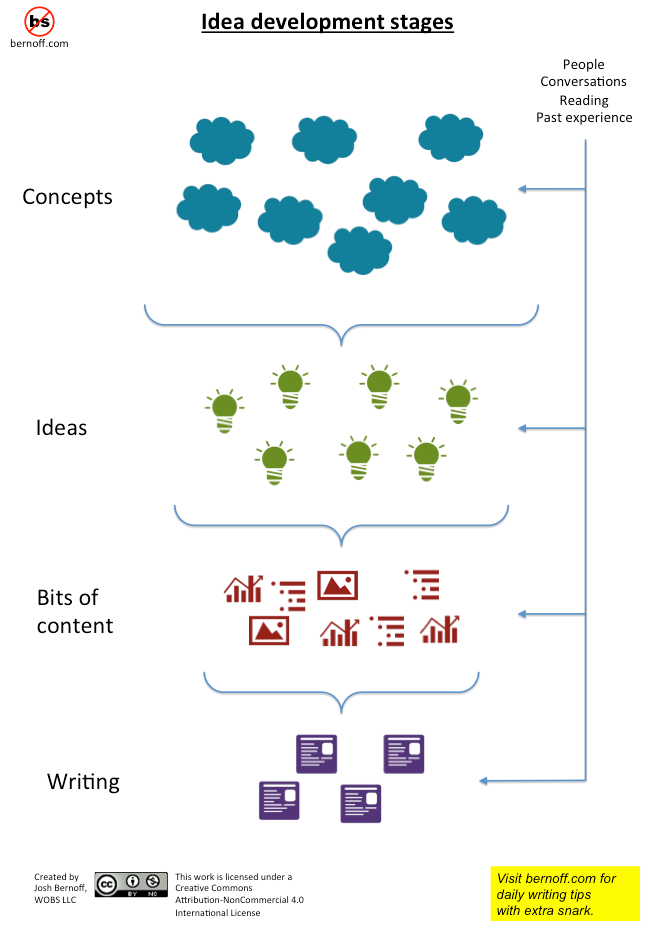How I develop ideas
 Ideas just happen. Or do they? As I’ve set myself ambitious goals for content, I need a process that generates ideas reliably. It fascinates me how my process requires both structure and randomness to work.
Ideas just happen. Or do they? As I’ve set myself ambitious goals for content, I need a process that generates ideas reliably. It fascinates me how my process requires both structure and randomness to work.
I honed these techniques as SVP of idea development for Forrester Research, and now I use them constantly. Perhaps you can benefit from them.
Counterintuitively, the most important element of idea development is a set of deadlines. Unless there is pressure to produce something by a given date, you’re unlikely to conceive something and finish it. I produce a blog post every weekday — you need ideas to do that. I also have a set of longer-term deadlines to produce book elements. To meet these deadlines, I need a cauldron of possible content simmering at all times.
The other key element is idea fuel. Ideas come from everywhere if you are in the right state of mind. I am constantly on the lookout for ideas about good writing, bad writing, writing methods, teaching of writing, sources of bullshit, effects of bullshit, sources and effects of candor, and related topics. My mind relates anything I watch, read, hear, or discuss to these topics. This includes not only the usual Web research but conversations with others in person or on in social media, articles I read, and the whole of my current and past experience.
When I was an analyst I did the same thing; only the topic was different. I might have been looking for ideas about the television industry, or social media in companies, or the impact of technology on business. What ideas are you seeking? Is your mind open to finding them?
The result of this activity isn’t ideas yet, it’s unformed concepts. At any given time I may have hundreds of these floating around. While I don’t formally track them, my Evernote is full of tagged items and notes that document them. I’m not sure why I’m not more diligent in organizing this material, but just letting it float around in my head seems to generate more interesting connections.
Because I’m seeking ideas, I am constantly looking for ways to turn the concepts into actual ideas. As a movie-industry character said in Woody Allen’s “Annie Hall”:
“Right now, it’s only a notion. But I think I can get money to make it into a concept. And later turn it into an idea.” — from “Annie Hall”
What does it take to turn a concept into an idea? You have to connect with other concepts and content and your experience. Most of all, it needs a “hook” — that is, a quick and intriguing way of describing things.
Once you’ve got an idea with a hook, you’re onto something. But it’s not done yet. This is where I proactively pull together content I find online, from past notes, or just things I think of as I write about it. I assemble these bits of content onto a written piece — typically, for me, that’s a blog post.
When I can, I let it sit for a day and come back to it, and I typically have a fresh perspective that makes it better.
Most people don’t think about this process in any formal way (or they may be superstitious that it loses its magic when you think about it). As I consider it, I’m fascinated by the parallel idea-development tracks in my brain. Part of my mind is doing formal activities like research. But at the same time, I’m constantly semi-consciously turning over bits and pieces of ideas and trying to fit them into a structure. This happens when I’m talking to people, when I’m biking, even when I wake up in the middle of the night (and I suspect, while I’m sleeping, too). When I sit down to write, all that activity, together, generates something worth reading.
How do you develop ideas? I’d like to hear about it.

Pretty much the same way although I would be hard pressed to come up with something original on a daily basis – matter of fact I’m curious why you picked that frequency. Wouldn’t once or twice a week suffice? Do you think you can keep both quality and quantity at that rate over the long run?
Thanks.
Jerome, you ask a good question, and you’re not the first.
I have the time to blog daily, and it has become a sort of mission for me.
I try to create quality content daily. The “hits” are unpredictable so I maximize the chances by requiring myself to blog daily. This is also building up a bank of content that will become the next book. It’s a discipline of working on something every day.
Ok right, I can see the book being a good motivator for pushing out the building blocks daily. It’s not a bad gig – too bad one can’t make a decent living at it 😉
Well, i always thought my ideas just happened until i read this article. I now realise that i unconsciously look around my environment and daily activities for material for my next blog post. In fact, i recently wrote about the relevance of my posts here https://talk2ferdy.wordpress.com/2015/07/08/writing-for-me/
Hi Josh,
Great post. As a book author I am constantly turning new ideas around and figuring out how to make them bigger. I agree that deadlines are key. Does your process change when you are writing book chapters?